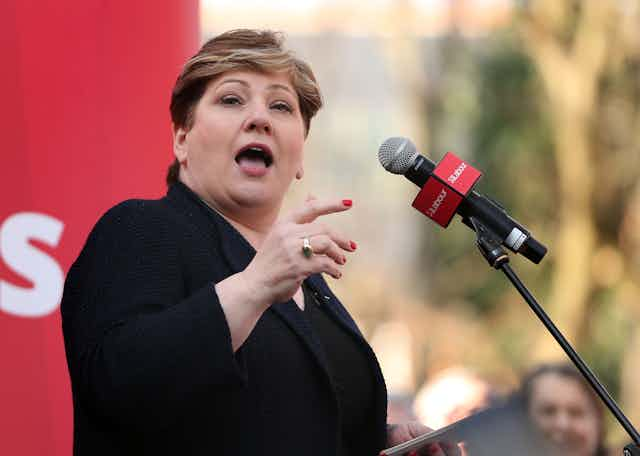Shadow foreign secretary Emily Thornberry’s recent speech at a Labour rally in Beeston, Nottinghamshire, is a sad reflection of all that is currently wrong with British politics. If a culture of civility is to be nurtured and cherished then bombastic, barbed and personalised attacks must themselves be subject to the ridicule and condemnation they deserve.
When speaking about the decision of some of her parliamentary colleagues to leave the Labour Party to form the Independent Group, Thornberry’s diatribe was quite extraordinary.
Possibly oversimplifying a complex reality, it is possible to suggest that the departing MPs felt the party had lurched to the left in a manner that had become narrowly tribal, often aggressive and intolerant of internal questioning. Some feel Labour is unable to deal with accusations of antisemitism and prone to a style of party management synonymous with bullying. These are serious accusations that have been around for some time and brought into sharp relief by the creation of the Independent Group of MPs. So how did the Labour Party leadership respond?
Anyone watching Thornberry’s speech would be hard pressed not to conclude that it responded in a manner that appeared to be almost designed to sustain almost all of the accusations and criticisms above. Thornberry’s remarks were tribalist populism of the lowest order:
We would rather die than join any other party and we would never think of joining the other eight people who have decided to abandon Labour and cuddle up to the Tories.
You really cannot beat a good old bit of “death before betrayal” rhetoric to whip up a crowd and it didn’t take long for Thornberry to talk of “abandonment” and “betrayal” and how the miscreants would be “crushed” if by-elections were held. With a worrying slip into the royal “we” that denied any possibility that the audience might have views that departed from her own, she declared: “We are Labour to our core and Labour to the tips of our fingerprints!”
Deeper signals
It’s probably quite clear to most people that British politics is undergoing something of a shake up. To label it in this manner is somewhat understated, arguably quaint and therefore typically British. In reality a more direct and accurate interpretation might suggest that the postwar party system appears to be in danger of almost total collapse.
Brexit is not to blame. It simply emerged as the symptom of a far deeper democratic malaise: the failure of political parties to keep pace and connect with a rapidly changing society. A gap between the governors and the governed emerged and a situation defined by uncertainty and flux has become the new normal. As such, Brexit has become the lightning rod for public frustration and the dilemma faced by the leaders of both the Labour and Conservative parties is how to prevent it from rupturing their parties right down the middle.

If the fabric of British party politics has been fraying for some time, then the first clear tear emerged when the eight MPs left the Labour Party and were quickly followed by three from the Conservative Party. Since then, the main focus of public debate and media commentary has understandably been on the chances of this new grouping sustaining some momentum (not that Momentum).
And yet this focus is arguably too obvious. Surely the bigger question revolves around the capacity of the two main parties to pick up on and address the deeper signals and concerns that these departing MPs were so desperately trying to send to them. Put slightly differently, what evidence is there that either party possesses the emotional intelligence to reflect and react in a constructive manner?
Thornberry’s intervention was laughable but also slightly sad. Especially when the hyperbole slipped into vindictive personal mockery. These MPs, Thornberry explained to the crowd, had all benefited at the last general election from Labour leader Jeremy Corbyn. How else could their success be explained? “Maybe Gavin Shuker got himself a new haircut?” she asked the crowd, “Maybe Mike Gapes got himself some new glasses?” – playground politics now in overdrive. “Maybe Chuka had been to a new tailor?”
This was all good tub-thumping stuff and I’m sure it’s water off a duck’s back to those that have left the party but there is arguably a deeper and potentially darker side to this performance – it’s exactly what all the research suggests the public are totally fed up with. Tribal tit-for-tat personalised negative politics with a populist twist. The British public simply don’t like it or buy it. They are far too good for it and so should their politicians be.
Almost beyond irony, it was a performance that managed to demonstrate everything that the ex-Labour members of the Independent Group sought to bring to the fore. The odd thing is that the leader of the Labour Party was also at the event. Leaders need to lead. There is no point denouncing bullying and promoting civility if senior members of your team don’t take those values to heart, or “right to the tips of their fingerprints”.

